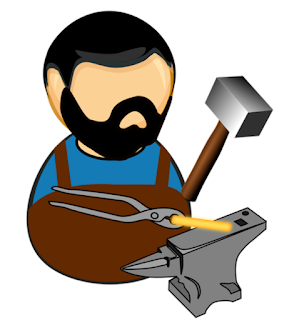Strike While the Iron is Hot!
 |
| publicdomainvectors.org/en/free-clipart/Blacksmith-sketch/63288 |
The advice "strike while the iron is hot" comes from blacksmiths, who would pull a piece of red-hot iron out of the coals with tongs and begin hammering into shape the horseshoe or hook or whatever the customer had ordered. If he waited until the iron cooled, it would be nearly impossible to shape and have to be moved into the fire again.
Research Log
I wrote before about my new favorite tool Airtable, and its older cousin, the spreadsheet. Now I'm using Airtable for my newest favorite, the research log. I've read about why to keep them, but have always chosen to trust my memory instead. This did not work very well! There are tools such as Goldie May which promise to automate the process, but after watching it in action, I don't think it would work for me.
Begin with the GPS
In the Research Like A Pro study group South King County GS is running for members, one of the necessary steps is a comprehensive research log. The log provides complete support for the first step in the Genealogical Proof Standard (GPS), reasonably exhaustive research. The APG has a wonderful short article on their website: Ten-Minute Methodology: “Reasonably Exhaustive”—How Do We Know We’re There? I like the questions, especially this one, "What is the risk of new evidence coming to light that will overturn this conclusion?" I want to be able to look at the sources I consulted and have the confidence that new evidence will support my conclusion.
The Magic of Linking
The reason I chose to use Airtable for my research log rather than a simpler spreadsheet, is that Nicole Dyer provided an Airtable template combining a Research Log and Friends, Associates and Neighbors (FANs). This is genius! Think of finding your target family in a census. We know we should look at the preceding and following pages, to see where the FANs are living. But how to capture that information in a useful way? In Airtable, these two databases are linked, so that the FANs show up in the Research Log as numbers or names, as you prefer. On the FANs base, the source documents are linked so that as you begin to type, a drop-down appears where you can choose whether you are seeing them in a census, will, deed, tax list, and such, and where. Then you can sort and group by record type, locality, surname, or whatever you want to analyze.
It's Hard!
Cool, cool, you might say. Why doesn't everyone do this then, if it's so great? I think it is because self-discipline is HARD. Changing from a free-wheeling research habit to one not just focused, but also exhaustive, is really hard.
Tackle the Hard Part First
I've decided the only way I can make myself do a real research log, where *every* record I search for or find is noted, is to put in all of the data first, before I search. That means the title or description of the database, book, or collection, the citation, the URL and my search terms. Once over that hump, the fun begins, and all that's left is describing the results! And If gold is found, then I can start logging the FAN club too, which is quite fun. I'm not sure I can force myself to do this, but I think the more it becomes routine, the happier I'll be. Why cite a source you will not use in your research report? Because now you will always have easy access to it, the next family member or FAN you want to search for. You need only do it ONCE. After that, citations, URLs, and search term lists can be copy-pasted into any place you need them.
Your Research Log Will Save You
Don't you hate it when you search for something, and then realize that you've already done it? A research log will save you from that futility. Don't you agonize even more when you remember that you forgot to search for *this* thing and not just *that* thing, such as a surname spelling variation, a neighboring township or county, a FAN, and then can't get back to where you need to, to re-search? A research log (and a detailed research plan) will save you that pain.
 |
| publicdomainvectors.org/en/free-clipart/Money-Pot-Vector/4092 |
In short, using a research log is short-term pain for long-term gain. This blog started with hot iron, but I'm searching for William McBee who was mining for gold in 1860. Like him I hope to find gold!
 |
| Valorie Zimmerman |




Comments
Post a Comment